|
|
|
Sort Order |
|
|
|
Items / Page
|
|
|
|
|
|
|
| Srl | Item |
| 1 |
ID:
173909
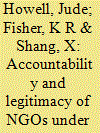

|
|
|
|
|
| Summary/Abstract |
How non-governmental organisations (NGOs) craft accountability and legitimacy in authoritarian states is poorly understood. We put forward a framework of analysis for capturing the processes of making accountability and legitimacy. We introduce the ideas of first- and second-order accountability and stocks of accountability capital. In authoritarian regimes, building second-order accountability through the accumulation of stocks of accountability is crucial for NGOs’ survival and organisational development and as a path towards gaining first-order accountability. Drawing on a decade of fieldwork on child welfare NGOs in China from 2007 to 2017, we select three case studies with long operational trajectories to illustrate processes of crafting legitimacy and accountability. The research contributes empirically and theoretically to the understanding of accountability in NGOs in authoritarian states through the novel analytic framework and case study of China.
|
|
|
|
|
|
|
|
|
|
|
|
|
|
|
|
| 2 |
ID:
173911
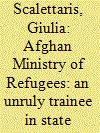

|
|
|
|
|
| Summary/Abstract |
This article looks at the interactions between the officials of the United Nations High Commissioner for Refugees (UNHCR)’s mission in Afghanistan and the heads of the Afghan Ministry of Refugees in the mid-2000s. It examines the rationales that guide officials at both the UNHCR and the ministry, as a way of unpacking the politics of state capacity building in post-2001 Afghanistan. The first section looks at the tense relationship between the two bodies from the point of view of UN officials, who strive to redress a ministry portrayed as ‘incapable’. By looking in turn at the fundaments of the political legitimacy of the Afghan state, at how international intervention transforms the Afghan political arena, and at Afghanistan’s position in global power relations, the following sections identify three rationales that can be ascribed to ministry officials, namely reconciling internal and external state legitimacy, strategic resource tapping and resistance to inter-state hegemony. From its standpoint at the juncture between an ‘external’ and a ‘local’ institution, the article ultimately stresses the importance of gaining epistemological distance from the peace building project in order to consider ‘local’ actors as full political actors.
|
|
|
|
|
|
|
|
|
|
|
|
|
|
|
|
| 3 |
ID:
173912
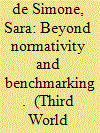

|
|
|
|
|
| Summary/Abstract |
The concept of human security became popular in the 1990s as a new framework for conceptualising security, shifting its referent from states to human beings and expanding its scope. While acknowledging the widespread criticism and rich debate that developed around the concept of human security after its appearance, this paper analyses the context in which human security emerged as a concept and reviews its different usages with a particular focus on its application to Africa and refugee-hosting areas. It maintains that the contribution of this concept goes beyond the simple statement that security is a matter of people’s lives. Thanks to its focus on subjective understandings of security, human security can be used as an analytical framework to produce context-specific knowledge about security based on people’s perceptions of what makes them secure/insecure and on local practices of human security – what people do to feel more secure. The application of a human security framework to refugee-hosting areas in Africa would contribute towards enhancing refugees’ agency in a context often dominated by a victimising narrative, as well as providing a comprehensive understanding of security priorities, providing important information for more context-specific policymaking.
|
|
|
|
|
|
|
|
|
|
|
|
|
|
|
|
| 4 |
ID:
173907
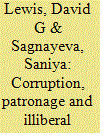

|
|
|
|
|
| Summary/Abstract |
This article engages critically with recent literature on political settlements through a case study of inter-ethnic conflict in southern Kyrgyzstan. The case study traces how a new political settlement emerged in the aftermath of conflict, despite a rejection of international proposals on conflict resolution. Instead, local elites constructed an exclusionary form of social order, forged through dispossession and violence, maintained by informal institutions of patronage and clientage. The article explains why this new political settlement appeared remarkably resilient, despite its failure to address traditional liberal concerns regarding transitional justice and minority grievances. The case study highlights two major problems with the political settlements literature. First, it contests a widespread conceptualisation of political settlements as indicating a cessation of conflict, instead pointing to how a political settlement can be initiated and maintained through different forms of violence. Second, it questions notions of inclusivity in political settlements, noting that many political settlements combine logics of both inclusion and exclusion. In many cases, they are marked by exclusionary, authoritarian practices that together constitute a form of ‘illiberal peace’. These findings caution against a simplistic use of political settlements theory to inform policies aimed at resolving internal conflicts.
|
|
|
|
|
|
|
|
|
|
|
|
|
|
|
|
| 5 |
ID:
173910
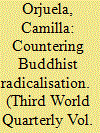

|
|
|
|
|
| Summary/Abstract |
Violence and hate speech endorsed by Buddhist monks against Muslim minorities in South and Southeast Asia have attracted global attention in recent years, and been the focus for a growing academic scholarship. This article turns the attention to peace activists, religious – including Buddhist – leaders and other civil society actors seeking to counter anti-Muslim agitation in Myanmar and Sri Lanka. Drawing on theories about social movements and countermovements, it analyses the diverse counter-forces, their activities and the obstacles they face. Doing so, the article contributes to an understanding of peacebuilding in religiously framed conflicts, and of the conditions for peace movements in an age of radicalisation and online activism. Based on interviews with civil society representatives and religious leaders, complemented with secondary sources, the study finds that although the peace movements are weaker and largely reactive to and restrained by the radical Buddhist nationalist movements, they constitute important counter-voices. The article also argues that the struggle between hate speech and counter speech in social media constitutes an important part of the movement–countermovement dynamics. Finally, the article suggests that theories on opposing movements can usefully be developed to enhance our understanding of mobilisation in different arenas in conflict-affected societies.
|
|
|
|
|
|
|
|
|
|
|
|
|
|
|
|
| 6 |
ID:
173906


|
|
|
|
|
| Summary/Abstract |
Recent analyses of development and extractivism in Latin America discuss how neoliberal and post-neoliberal strategies under the political economy of resource extraction define the developmental trajectory of national regimes. As most accounts privilege the analysis of structural and historical conditions over everyday practices of state actors, this paper contributes to the discussion by explaining how extractivism and neoliberalism are shaped, reproduced and defended in governmental spaces, defining in this way the development path. On the basis of ethnography of the Peruvian state, in-depth interviews and an analysis of economic, environmental and pro-indigenous policies during 2000–2017, this paper analyses how under the development model of extractivism, governing elites deploy neoliberal or post-neoliberal development strategies and development tools while advancing contradictory development discourses. In this context, states are cynical because, despite progressive regulations and political discourses, everyday actions of governing elites reinforce institutional and ideological constraints on the effectiveness of rights. The promises of pro-indigenous and environmental social reforms are limited from their very formulation because the practices and imaginaries of governing elites are embedded in extractive structures.
|
|
|
|
|
|
|
|
|
|
|
|
|
|
|
|
| 7 |
ID:
173903
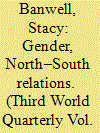

|
|
|
|
|
| Summary/Abstract |
In 2017, American President Donald Trump reinstated the ‘global gag rule’(GGR). This order bans new funding to nongovernmental organisations that provide abortion as a method of family planning, lobby to make abortion laws less restrictive, or provide information, referrals or counselling on abortions. In the same year the Trump administration defunded The United Nations Population Fund (UNFPA). The latter is reviewed against the backdrop of the conflict in Syria. These policies draw upon, and reproduce, normative representations of women as vulnerable, weak, passive and maternal. Focusing on women’s access to abortion following wartime rape, the meanings and implications of these policies are reviewed. Transnational and postcolonial feminist perspectives are used to unpack the core themes of this piece: gender, reproductive health care and foreign economic policy. Three main arguments are made: (1) US foreign policy on abortion under the Trump administration draws implicitly on conservative ideas about gender, sexuality and maternity; (2) denying female survivors of rape access to abortion – which is discriminatory and violates key international instruments – is a form of structural violence that amounts to torture; and (3) the GGR and the defunding of UNFPA reproduce structural inequalities between the Global North and the Global South.
|
|
|
|
|
|
|
|
|
|
|
|
|
|
|
|
| 8 |
ID:
173904
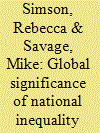

|
|
|
|
|
| Summary/Abstract |
Since the 1980s, inequality has been rising in Europe, North America and parts of Asia. How does our understanding of global inequality dynamics change if coverage is extended to the rest of the developing world? To rebalance the perspective on global inequality trends, this paper surveys data and literature on recent inequality trends in Latin America, Asia, Africa and the Middle East. It finds that in these regions there are more countries with falling than rising inequality over the past 20 years, as measured by Ginis of income or consumption inequality. At the global level, therefore, there are signs of inequality convergence, as inequality has been falling in countries with high inequality in the 1990s (particularly Latin America), and rising in historically low-inequality countries. We discuss the political and economic drivers of inequality decline in countries with a steady fall in the Gini. This suggests some common trends across the globe, including the role of democratisation, the rise of new social movements, and the expansion of education and social safety nets and favourable commodity prices, in reducing income disparities. This paper calls for more country-level comparisons of inequality trends, to highlight the multiplicity of paths in this latest phase of globalisation.
|
|
|
|
|
|
|
|
|
|
|
|
|
|
|
|
| 9 |
ID:
173905
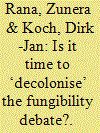

|
|
|
|
|
| Summary/Abstract |
Recent literature has established that development assistance is often fungible and that this is undesirable. In line with current efforts to ‘decolonise development studies’, we critically reflect on the underlying assumptions of this line of thinking. We establish a framework that differentiates between potential positive and negative fungibility. We hypothesise that recipient governments can redirect their own funds and achieve positive fungibility, if (1) the marginal value added in the alternative target sector/region is higher; (2) equity concerns are adequately addressed when other sectors/regions are supported; and (3) temporal delay helps to cushion instability of aid flows. There are indications that this positive fungibility might be quite prevalent. Future fungibility research should therefore no longer assume that fungibility is in itself undesirable.
|
|
|
|
|
|
|
|
|
|
|
|
|
|
|
|
| 10 |
ID:
173908


|
|
|
|
|
| Summary/Abstract |
This article explores the success chances of subaltern political agency. Empirically, it investigates how indigenous groups can prevent unwanted access to their traditional knowledge regarding biological resources. The article compares indigenous politics in Brazil and India. Brazilian movements effectively defend regulations to deny the disclosure of their knowledge, whereas comparable demands of the Adivasis in India have remained fairly neglected. To explain these differences, the article connects the insights of social movements and postcolonial theories. It shows that a synopsis of both literatures helps to explain both the potential and the limitations of indigenous political agency.
|
|
|
|
|
|
|
|
|
|
|
|
|
|
|
|
|
|
|
|
|